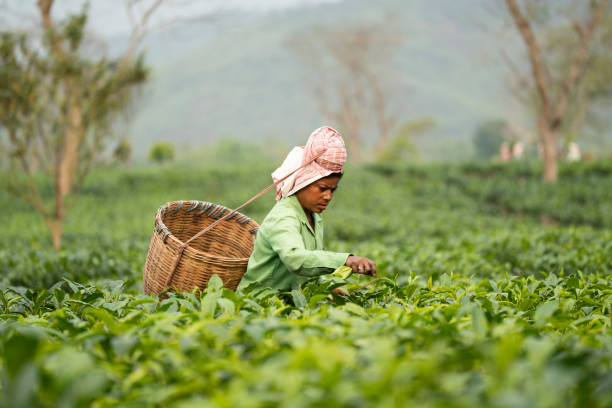As climate change continues to increase global temperatures, Assam’s tea crops are bearing the brunt. As a result, tea prices are skyrocketing in India as domestic demand rises, while the nation’s share in world trade is slipping.
International media reports highlight the story of Kamini Kurmi, a tea picker living in the northeastern Indian state of Assam. Her work requires delicately plucking tender leaves from the bushes—a task that demands patience and stamina. In the subtropical climate of Assam, where temperatures can climb up to 40°C (104°F), her job also requires consuming plenty of fluids to endure the heat.
“When it’s really hot, my head spins and my heart starts racing,” she told international media.
With rising temperatures and prolonged dry spells, tender leaves are often shriveled before they are picked. Extreme heat and frequent droughts are also threatening tea plantations in many other parts of India. Instances of tea twigs turning brown and shriveled are becoming increasingly common. As a result, India’s tea export industry is facing mounting pressure. The global tea trade is estimated to be worth over $10 billion annually.
Changes in temperature and rainfall patterns are no longer occasional anomalies—they are becoming the new normal, according to Rupanjali Dev Baruah, a scientist at the Tea Research Association in Assam. International reports note that India, famous for its Assam and Darjeeling teas named after their regions of harvest, is seeing these areas come under growing climate pressure. At the Tea Research Association in Jorhat, Assam, tea leaves are now being tested for heat tolerance and electrolyte leakage.
Rainfall, the main source of water for tea crops in the region, fell 38% short of the average during this year’s monsoon. This shortened the peak production season to just a few months, shrinking the window for harvesting. Higher temperatures and reduced rainfall have also triggered outbreaks of discoloration, spotting, and pest infestations, all of which damage delicate tea leaves, reduce yields, and increase input costs.
Last year’s drought already lowered crop yields, forcing many farmers to use more pesticides on their fields. This not only increases input costs but has also led to harmful substances, such as glyphosate, being detected in Assam tea sold worldwide, including in Germany. Farmers argue that pesticides are necessary to protect their harvests, even though they add health and environmental risks.
India’s total exports of high-quality tea are on the decline, while imports have nearly doubled, reaching 45.3 million kilograms in 2024. One of India’s top competitors in the global tea market, Kenya, is also reporting production deficits. This suggests that climate change could shrink global supply chains in total, ultimately driving up world market prices.


